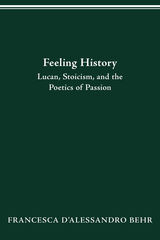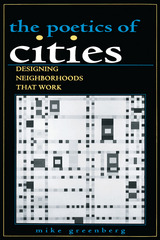2 books about POETICS

FEELING HISTORY
LUCAN, STOICISM, AND THE POETICS OF PASSION
FRANCESCA D'ALESSANDRO BEHR
The Ohio State University Press, 2007
Feeling History is a study of apostrophe (i.e., the rhetorical device in which the narrator talks directly to his characters) in Lucan’s Bellum Civile. Through the narrator’s direct addresses, irony, and grotesque imagery, Lucan appears not as a nihilist, but as a character deeply concerned about ethics. The purpose of this book is to demonstrate how Lucan’s style represents a criticism of the Roman approach to history, epic, ethics, and aesthetics. The book’s chief interest lies in the ethical and moral stance that the poet-narrator takes toward his characters and his audience. To this end, Francesca D’Alessandro Behr studies the ways in which the narrator communicates ethical and moral judgments. Lucan’s retelling of this central historical epic triggers in the mind of the reader questions about the validity of the Roman imperial project as a whole.
An analysis of selected apostrophes from the Bellum Civile allows us to confront issues that are behind Lucan’s disquieting imagery: how can we square the poet’s Stoic perspectives with his poetically conveyed emotional urgency? Lucan’s approach seems inspired by Aristotle, especially his Poetics, as much as by Stoic philosophy. In Lucan’s aesthetic project, participation and alienation work as phases through which the narrator leads the reader to a desired understanding of his work of art. At the same time, the reader is confronted with the ends and limits of the aesthetic enterprise in general.
Lucan’s long-acknowledged political engagement must therefore be connected to his philosophical and aesthetic stance. In the same way that Lucan is unable to break free from the Virgilian model, neither can he develop a defense of morality outside of the Stoic mold. His philosophy is not a crystal ball to read the future or a numbing drug imposing acceptance. The philosophical vision that Lucan finds intellectually and aesthetically compelling does not insulate his characters (and readers) from suffering, nor does it excuse them from wrongdoing. Rather, it obligates them to confront the responsibilities and limits of acting morally in a chaotic world.
[more]

POETICS OF CITIES
DESIGNING NEIGHBORHOODS THAT WORK
MIKE GREENBERG
The Ohio State University Press, 1995
"Journalist Mike Greenberg is appalled by what had happened to his home town, San Antonio, Texas. In response, he has written a readable and useful book . . . . which is full of practical suggestions for improving his own and other communities. . . . Planners, architects, and city officials should read this practical and hopeful book." --Planning
In this lively and insightful book, Mike Greenberg argues that the purpose of cities and neighborhoods is to foster economic, social, and intellectual exchange, the process that underlies the creation of value. He seeks to show how the detailed geography of the city can either inhibit or encourage such exchanges and thus profoundly affect the lives of the people who live there.
Cities filled an important evolutionary niche, historically, because they were the places--in contrast to rural areas or villages--where exchange occurred with greatest efficiency, where value was created most spectacularly, and thus where the wealth was. But it wasn't just the fact of concentration, but the how of it, that made cities efficient producers of value and circulators of wealth.
The Poetics of Cities is concerned with the context of contemporary cities and suburban rings, where development dynamics--guided by the needs of the automobile and by reformist planning concepts that went awry--create environments that are increasingly hostile to exchange and thus threaten to inhibit the economic development that made them possible in the first place.
The city of late nineteenth- and early twentieth-century America was in some ways a remarkably sophisticated technology for fostering exchange and cementing community. Taking examples mostly from his hometown, San Antonio, Texas, Greenberg examines certain features of those cities--their sidewalk systems, their scale and setbacks, the rhythms of their streetscapes, the structure of their neighborhoods--and shows why they worked so well, and why they cannot be arbitrarily tossed aside without doing damage to the urban economy. He then offers some practical planning strategies and regulatory ideas to help cities retain what is useful from their traditional forms while at the same time accommodating modernity.
Engagingly written, The Poetics of Cities will make fascinating reading for architects, urban planner, neighborhood activists, city officials, real estate developers, and anyone interested in the quality of urban life in America.
Mike Greenberg is Senior Critic of the San Antonio Express-News. He is the author of Synthesis: Craftsmanship, Architecture, Design and was a John S. Knight Fellow at Stanford University.
[more]
READERS
Browse our collection.
PUBLISHERS
See BiblioVault's publisher services.
STUDENT SERVICES
Files for college accessibility offices.
UChicago Accessibility Resources
home | accessibility | search | about | contact us
BiblioVault ® 2001 - 2024
The University of Chicago Press









